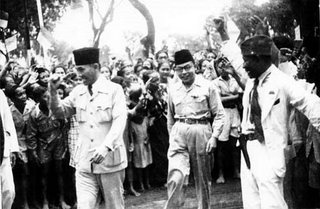Time Magazine Nov. 5, 2006 By Emil Salim
Indonesia's struggle for independence is typically identified with one larger-than-life figure: the irrepressible Sukarno�proud, charismatic, a firebrand orator, but also capricious and wont to personal mood shifts that would jostle the country. While Sukarno was the flamboyant face of the fight to liberate Indonesia from Dutch rule, he was only one-half of a tandem that was a study in contrasts. Sukarno's cohort was Mohammad Hatta, studiously humble, deeply Muslim yet open to all faiths, and unfailingly direct. Indonesians may worship Sukarno, Indonesia's first President, but they love his former deputy Hatta, not just for what he did for his country but for what he, rather than Sukarno, still represents. Today, 26 years after his death, Hatta remains a symbol of what Indonesia aspired to become but has yet to fully achieve: an egalitarian and tolerant land with dignity for all.
That was Hatta's goal, and the path to it first required shaking off the colonial yoke. Hatta was born on Sumatra in 1902, but moved to the Netherlands as a student in 1921 and spent more than a decade there. During that period, he created the Indonesian Association in the Netherlands, at a time when just saying the name Indonesia was a radical act (the Dutch called the archipelago Netherlands Indie). He launched a "non-cooperation" campaign in the Netherlands, which drew the attention of nationalists in Indonesia like Sukarno. In 1927, the Dutch imprisoned Hatta for being antigovernment. The charges didn't stick; Hatta was released and went back to his studies in Rotterdam. He returned to Indonesia in 1932, organized a political movement against the Dutch, and spent eight of the next 10 years in jail. When the Japanese ousted the Dutch in 1942, Hatta was freed because the Japanese wanted his and Sukarno's help to run the sprawling archipelago. They went along, all the while putting together a shadow administration for the day the Japanese would themselves surrender. In the run-up to independence in August 1945, Hatta persuaded Islamic leaders to drop their demand that the President had to be Muslim and that shari'a law be enacted for Muslim citizens, and enshrined in the constitution the recognition of other religions and the rights to assembly and expression.
Ten years later, Hatta broke with Sukarno. I was a student leader at the time and he gave me and 11 of my associates the news firsthand on the verandah of his official residence in Jakarta. Hatta opposed Sukarno's increasing authoritarianism and his strategy of playing off nationalists, communists, Islamists and the military against one another�which Hatta believed would bring the nation grief. It did. In 1965, a major-general called Suharto used the chaos created by such intrigue to seize power in a bloody coup�some half a million people died�to prevent an alleged communist takeover.
Hatta went on to teach economics and politics at a university in Yogyakarta, but continued to criticize policies he felt were detrimental to Indonesia, under both Sukarno and Suharto. He spoke out against corruption, poor governance, a weak judiciary, the gap between rich and poor. Today, Indonesia has progressed on all these fronts, but not so far as to be able to do without a Hatta. When he died in 1980 at the age of 77, he was buried not in the Heroes Cemetery in Jakarta but, as he requested, a few kilometers away in a common graveyard. I remember watching as thousands lined up, with tears in their eyes, to pay their respects to the country's first truly democratic leader.
Photograph : Dwitunggal visit East Java, April 1946


 ']]}
']]}

